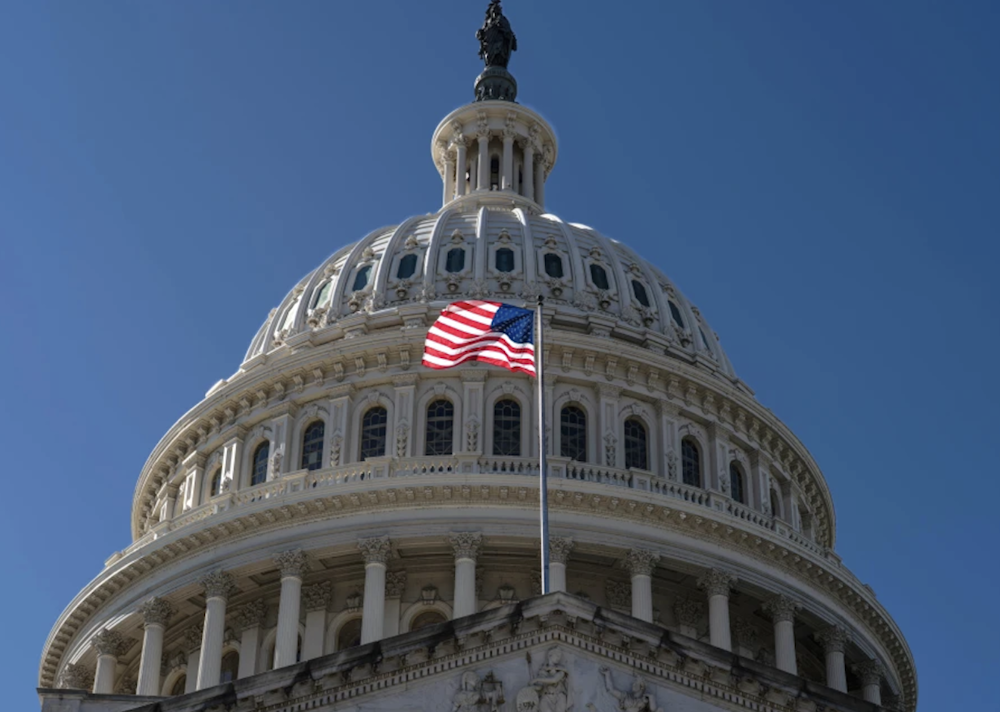Senate votes to repeal Caesar sanctions on Syria
The US Senate votes to lift Caesar sanctions on Syria, paving the way for potential economic recovery, though uncertainty remains in the House.
-

The American flag waves over the Capitol in Washington on the ninth day of the government shutdown on October 9, 2025. (AP)
The US Senate has voted to repeal the Caesar sanctions on Syria, a move that could open the door to renewed economic activity and reconstruction efforts in the war-torn country.
The repeal was included in the Senate’s annual defense policy bill, which passed late Thursday in a 77-20 vote. Though welcomed by many lawmakers and regional experts, the provision’s future remains uncertain as it was not included in the House version of the bill.
Senate passes defense bill including Caesar sanctions repeal
The Caesar sanctions, enacted in 2020, imposed some of the harshest restrictions on the Syrian economy, targeting international investors and institutions to prevent financial engagement with Syria’s public and private sectors.
While former President Donald Trump had signaled a desire to lift the sanctions, they remained in place, hindering Syria's economic recovery.
Uncertainty in House over full repeal
Senate’s move faces resistance in the House of Representatives, where some lawmakers are opposed to a full repeal. Rep. Joe Wilson (R-S.C.), a longtime advocate for lifting the sanctions, reiterated his support.
“These very severe sanctions were imposed on a regime which, thankfully, no longer exists,” Wilson wrote on X. “Syria’s success now depends on FULL and TOTAL repeal.”
The House and Senate will need to reconcile their versions of the bill in conference.
Compromise reached on Human Rights conditions
The repeal was the result of a compromise between Senators Lindsey Graham (R-S.C.), Chris Van Hollen (D-Md.), and Jeanne Shaheen (D-N.H.). While Graham initially opposed lifting the sanctions, he agreed to a version that includes human rights benchmarks.
Under the revised language, sanctions are immediately lifted, but the President must report to Congress on Syria’s progress on human rights and counterterrorism. The bill does not include a “snapback” mechanism but states it is the "sense of Congress" that sanctions should return if Syria fails to meet key conditions.
A Democratic aide described the measure as “a compromise everyone involved can live with,” though they acknowledged the continued presence of the "Caesar" label may discourage investment.
Syria sees vote as signal toward reconstruction
Syria’s Finance Minister Mohammed Yisr Barnieh welcomed the Senate vote, thanking diplomats who worked behind the scenes to advocate for repeal.
“This is a clear message to those who doubt Syria’s future that, with God’s help, Syria is [moving] toward stability, flourishing, and development,” Barnieh wrote on Facebook.
Remaining sanctions and investment hesitation
Despite the Senate vote, some sanctions remain in place, including Syria’s designation as a state sponsor of terrorism. President Trump holds the authority to rescind the designation unilaterally but has so far only directed the State Department to review Syria’s status.
Experts warn that foreign investors may remain cautious. “There will still be a significant amount of hesitation because the word Caesar is still in there,” a congressional aide told RS.
If the House joins the Senate in repeal, it could represent a turning point in US-Syria policy and signal a shift toward supporting Syria’s reconstruction, estimated to cost as much as $400 billion.

 3 Min Read
3 Min Read








